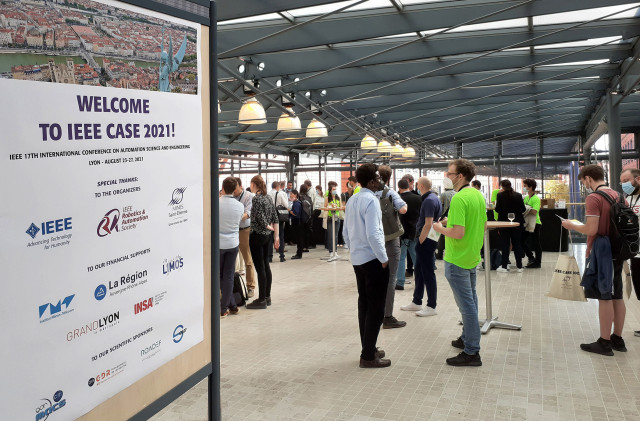
Robohub.org
IEEE 17th International Conference on Automation Science and Engineering paper awards (with videos)
by Daniel Carrillo-Zapata and IEEE Robotics and Automation Society (RAS)
27
October
2021
share this:

The IEEE International Conference on Automation Science and Engineering (CASE) is the flagship automation conference of the IEEE Robotics and Automation Society and constitutes the primary forum for cross-industry and multidisciplinary research in automation. Its goal is to provide a broad coverage and dissemination of foundational research in automation among researchers, academics, and practitioners. Here we bring you the online presentations by the finalists of the four awards given at the conference. Congratulations to all the finalists and winners!
Best student paper award
Winner
- Designing a User-Centred and Data-Driven Controller for Pushrim-Activated Power-Assisted Wheels: A Case Study
Mahsa Khalili, H.F. Machiel Van der Loos and Jaimie Borisoff
Finalists
- Including Sparse Production Knowledge into Variational Autoencoders to Increase Anomaly Detection Reliability
Tom Hammerbacher, Markus Lange-Hegermann, Gorden Platz
- Synthesis and Implementation of Distributed Supervisory Controllers with Communication Delays
Lars Moormann, Reinier Hendrik Jacob Schouten, Joanna Maria Van de Mortel-Fronczak, Wan Fokkink, Jacobus E. Rooda
- Optimal Planning of Internet Data Centers Decarbonized by Hydrogen-Water-Based Energy Systems
Jinhui Liu, Zhanbo Xu, Jiang Wu, kun liu, Xunhang Sun, Xiaohong Guan
- Deep Reinforcement Learning for Prefab Assembly Planning in Robot-Based Prefabricated Construction
Zhu Aiyu, Gangyan Xu, Pieter Pauwels, Bauke de Vries, Meng Fang
- Singularity-Aware Motion Planning for Multi-Axis Additive Manufacturing
Charlie C.L. Wang, Tianyu Zhang, Xiangjia Chen, Guoxin Fang, Yingjun Tian
Best conference paper award
Winner
- Extended Fabrication-Aware Convolution Learning Framework for Predicting 3D Shape Deformation in Additive Manufacturing
Yuanxiang Wang, Cesar Ruiz, Qiang Huang
Finalists
- Probabilistic Movement Primitive Control Via Control Barrier Functions
Mohammadreza Davoodi, Asif Iqbal, Joe Cloud, William Beksi, Nicholas Gans
- Efficient Optimization-Based Falsification of Cyber-Physical Systems with Multiple Conjunctive Requirements
Logan Mathesen, Giulia Pedrielli, Georgios Fainekos
Best application paper award
Winner
- A Seamless Workflow for Design and Fabrication of Multimaterial Pneumatic Soft Actuators
Lawrence Smith, Travis Hainsworth, Zachary Jordan, Xavier Bell, Robert MacCurdy
Finalists
- Dynamic Multi-Goal Motion Planning with Range Constraints for Autonomous Underwater Vehicles Following Surface Vehicles
James McMahon, Erion Plaku
- OpenUAV Cloud Testbed: a Collaborative Design Studio for Field Robotics
Harish Anand, Stephen A. Rees, Zhiang Chen, Ashwin Jose Poruthukaran, Sarah Bearman, Lakshmi Gana Prasad Antervedi, Jnaneshwar Das
Best healthcare automation paper award
Winner
- Hospital Beds Planning and Admission Control Policies for COVID-19 Pandemic: A Hybrid Computer Simulation Approach
Yiruo Lu, Yongpei Guan, Xiang Zhong, Jennifer Fishe, Thanh Hogan
Finalists
- Rollout-Based Gantry Call-Back Control for Proton Therapy Systems
Feifan Wang, Yu-Li Huang, Feng Ju
- Progress in Development of an Automated Mosquito Salivary Gland Extractor: A Step Forward to Malaria Vaccine Mass Production
Wanze Li, Zhuoqun Zhang, Zhuohong He, Parth Vora, Alan Lai, Balazs Vagvolgyi, Simon Leonard, Anna Goodridge, Ioan Iulian Iordachita, Stephen L. Hoffman, Sumana Chakravarty, B Kim Lee Sim, Russell H. Taylor
tags: c-Research-Innovation

Daniel Carrillo-Zapata
was awared his PhD in swarm robotics at the Bristol Robotics Lab in 2020. He now fosters the culture of "scientific agitation" to engage in two-way conversations between researchers and society.

Daniel Carrillo-Zapata
was awared his PhD in swarm robotics at the Bristol Robotics Lab in 2020. He now fosters the culture of "scientific agitation" to engage in two-way conversations between researchers and society.

IEEE Robotics and Automation Society (RAS)
strives to advance innovation, education, and fundamental and applied research in robotics and automation

IEEE Robotics and Automation Society (RAS)
strives to advance innovation, education, and fundamental and applied research in robotics and automation
Related posts :
Reversible, detachable robotic hand redefines dexterity
EPFL
19 Feb 2026
A robotic hand developed at EPFL has dual-thumbed, reversible-palm design that can detach from its robotic ‘arm’ to reach and grasp multiple objects.
“Robot, make me a chair”
MIT News
17 Feb 2026
An AI-driven system lets users design and build simple, multicomponent objects by describing them with words.
Robot Talk Episode 144 – Robot trust in humans, with Samuele Vinanzi
Robot Talk
13 Feb 2026
In the latest episode of the Robot Talk podcast, Claire chatted to Samuele Vinanzi from Sheffield Hallam University about how robots can tell whether to trust or distrust people.
How can robots acquire skills through interactions with the physical world? An interview with Jiaheng Hu
AIhub and Lucy Smith
12 Feb 2026
Find out more about work published at the Conference on Robot Learning (CoRL).
Sven Koenig wins the 2026 ACM/SIGAI Autonomous Agents Research Award
AIhub
10 Feb 2026
Sven honoured for his work on AI planning and search.
Robot Talk Episode 143 – Robots for children, with Elmira Yadollahi
Robot Talk
06 Feb 2026
In the latest episode of the Robot Talk podcast, Claire chatted to Elmira Yadollahi from Lancaster University about how children interact with and relate to robots.
New frontiers in robotics at CES 2026
Henry Hickson
03 Feb 2026
Henry Hickson reports on the exciting developments in robotics at Consumer Electronics Show 2026.
Robot Talk Episode 142 – Collaborative robot arms, with Mark Gray
Robot Talk
30 Jan 2026
In the latest episode of the Robot Talk podcast, Claire chatted to Mark Gray from Universal Robots about their lightweight robotic arms that work alongside humans.



